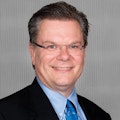Greetings, my fellow Americans (and all of you devoted readers across the borders and seas).
Citizens of the United States of America head to the polls on November 3 to vote for a variety of incumbents and challengers, but perhaps the most popular contest by far this leap year is whether to extend the term of the 45th president or elect the 46th president.
Whatever the outcome of this 21st century election, you might be surprised to know the supply chain connections to several 19th and 20th century presidents.
In my private life I’m working on a presidential trivia book set against the backdrop of notable and noteworthy historical events, decisions and crises. As of this writing in early October, I’ve surpassed 900 questions through the Ronald Reagan administration of the 1980s. By the time you may be reading this, I should have cleared more than a 1,000 questions through 2020.
You might ask … pffft! Why?
Well, you can learn a lot by “looking backward.” (Yes, that’s a favorable nod to Edward Bellamy’s superb 1888 sci-fi novel.) The personalities. The platforms. The politics. How they mingle and mix – especially those behind-the-scenes deals and previously unknown negotiations between candidates, and the comradeship between past presidents and their contributions to current decisions and trends.
Out of 45 presidents to date, five (or 11 percent) recorded some hands-on roots in supply chain operations, be that in military service or in civilian service as part of, or in the aftermath of, war.
Four of the five served distinctly as military branch quartermasters – three in the Army and one in the Navy.
No. 18, Hiram U. Grant (you probably know him better as Ulysses S. Grant) (1869-1877) served as an Army quartermaster during the Mexican War (1846-1848).
No. 21, Chester A. Arthur (1881-1885) served as an Army state quartermaster (first assistant general and then general quartermaster) during the Civil War (1861-1862).
No. 25, William McKinley Jr. (1897-1901) served as a quartermaster sergeant during the Civil War, achieving heroic status for driving a supply wagon through Confederate fire in Antietam to outfit isolated Union troop units. Additional war-time feats earned him several more promotions – one even from future president Rutherford B. Hayes. McKinley ended as brevet major.
No. 31, Herbert C. Hoover (1929-1933), an engineer by training with a specialty in mining, initially orchestrated and oversaw massive humanitarian aid and relief programs in Europe during World War I, which led to President Woodrow Wilson asking him to lead the American Food Administration through the war and then the American Relief Administration after the war. As Commerce Secretary for Presidents Warren G. Harding and Calvin C. Coolidge, he worked to standardize a variety of industrial commodities to streamline operations and supply chains nationwide. President Harry Truman also recruited Hoover to help reorganize government bureaucracy following World War II as the Marshall Plan fortified war-torn Europe.
No. 37, Richard Nixon (1969-1974) worked with supplies as part of the Navy in the South Pacific in 1943 during World War II.
A number of the early presidents counted farming in their background. Many were lawyers and diplomats and quite a few served as state governors, which granted them management experience.
Not surprisingly, diplomacy, law, management and production/provision (farming and operations) represent key areas that strengthen Supply Chain Management.
So the next time you hear someone berate Supply Chain as part of the “Basement Brigade,” be sure to enlighten them about their links to history and greatness.
Epilogue: No. 20, James A. Garfield (March-September 1881) may be recorded as the second president assassinated by a bullet, but he actually died from an infection that was traced to his physician’s unclean hands and the use of unsterilized instruments. The caveat? Remember to wash your hands and thank your sterile processing professional colleagues.
About the Author
Rick Dana Barlow
Senior Editor
Rick Dana Barlow is Senior Editor for Healthcare Purchasing News, an Endeavor Business Media publication. He can be reached at [email protected].

